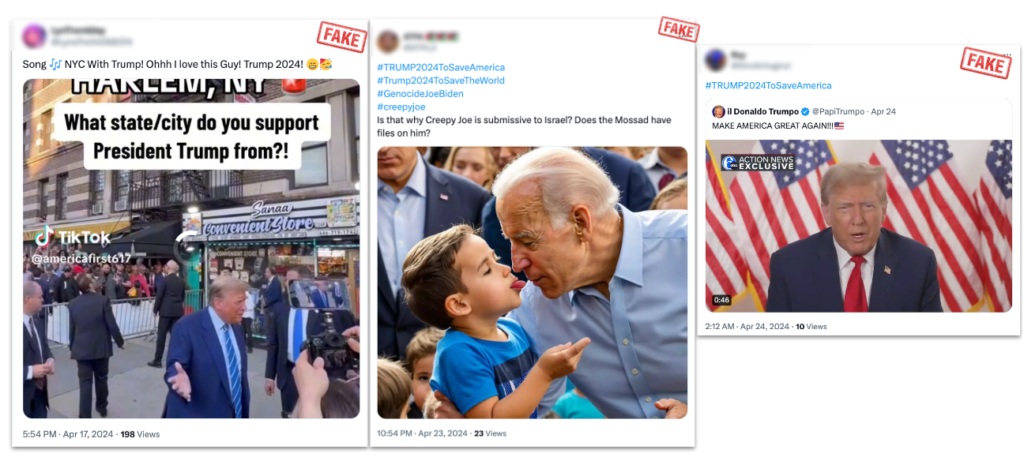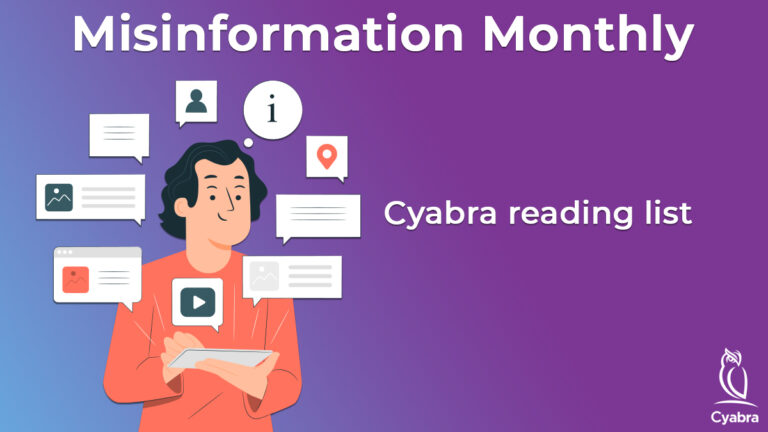244 million Americans are eligible to vote in the US presidential elections, that will take place on November 5, 2024.
It won’t be an exaggeration to say that election disinformation regarding the current elections has been spreading on social media since the previous elections ended in 2020. Of course, the closer we get to the election, the more disinformation we are exposed to. And while we might be more aware of their existence and manipulations, fake profiles still have a huge impact on swaying public opinion.
TL;DR?
- During a span of two months, among the profiles supporting Trump and criticizing Biden on X, 15% were fake.
- The propaganda spread by the fake profiles reached a potential 185 million views.
- Overall, the fake profiles’ content amounted to 17,367 posts, shares, and replies.
- The fake campaign is still active, pushing hashtags like #Trump2024ToSaveAmerica and messages such as “Biden is the worst president the U.S. has ever had.”
Election Under a Storm of Disinformation
Cyabra analyzed election discourse over the course of two months and uncovered that fake profiles in election conversations interacted on social media platforms 17,367 times, which included original posts (10,666) and replies to other profiles (6,701).
Here is the real concerning number: content posted by the fake profiles reached the potential eyes of 185,818,000 profiles.

Fake profiles posting about the upcoming presidential elections.
Red Alert: Fake Profiles Rally for Trump
15% of the profiles on X criticizing Joe Biden and praising Donald Trump were fake. Among fake profiles praising Joe Biden and criticizing Donald Trump, 7% were fake.
Cyabra’s research also uncovered two fake Pro-Trump campaigns pushing two main narratives:
1. “Vote for Trump” fake campaign, which used the hashtags #Trump, #Trump2024, #VoteForTrump, #TrumpWon, #VoteRed, #Trump2024toSaveAmerica, #Trump2024theOnlyChoice, #Trump2024AmericaFirst, and #TrumpNowMoreThanEver.
2. Anti-Biden fake campaign, which spread messages like “Biden is the worst president of the US”, and “Democrats / Biden are destroying America”, using hashtags like #BidenWorstPresidentEver, #DemocratsAreDestroyingAmerica, and, particularly on Facebook, the hashtag #GenocideJoe.
Using those popular hashtags and sophisticated repetitive interactions, the fake profiles infiltrated authentic discussions, effectively disseminating their narratives to influence the conversation and taking advantage of the escalating tension between the two parties as the election draws near.
Fake profiles (red) using the hashtag #Trump2024toSaveAmerica effectively integrated into an authentic community (green) that echoed their message wider.
Vote Truth: Battling the Ballot Lies
For years now, the US elections have been the focus of elaborate fake campaigns, with midterm election conversations reaching 60% and 70% presence of fake profiles, and disinformation spreading cross-country, drilling down into local news and discourse. This isn’t an issue unique to the US elections, of course – in recent years, Cyabra has uncovered huge amounts of fake profiles in the Taiwanese election, the Latvian election, and many others.
However, this election year has seen a record number of fake profiles in discourse on social media, and an even greater record number of authentic profiles exposed to their content. Bad actors in election discourse have become more sophisticated, and have harnessed the power of GenAI and bot networks to manipulate public discourse. They might be politicians or their followers trying to gain votes, and they might also be foreign players trying to influence global topics. While awareness of fake profiles on social media and the risk they pose to our democracy has grown in recent years, when we confront a fake profile, chances are we won’t be able to tell it apart from an authentic profile.
Democracies and government organizations must be aware of the growing impact fake profiles have on our society and on our votes.
Learn more about Cyabra’s OSINT capabilities in monitoring elections discourse online and identifying fake campaigns and bot networks.


